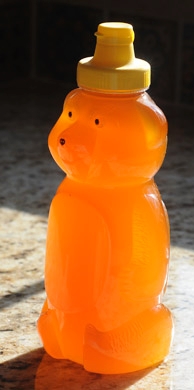Show me the honey
“Going green” means buying local honey, say honey bee experts at the University of California, Davis.
“It’s not only supporting the local beekeepers in our flagging economy, but imported honey can be problematic,” said bee breeder-geneticist Susan Cobey. “When you buy imported honey, you don’t always know what you’re getting. The ‘honey’ could be a mixture of corn syrup and water, or blends of honeylike products. It could contain pesticides or antibiotics. It could be mislabeled or from a different country or floral source than indicated on the label.”
“Also,” Cobey said, “you don’t know how it’s been treated after bottling. Heated honey, for example, breaks down the enzymes and causes the honey to lose flavor.”
Some unethical honey importers illegally mark their products or route them through other countries to avoid paying tariffs or to avoid public health safeguards.
A recent investigative report published in the Seattle Post-Intelligencer found that “big shipments of contaminated honey from China are frequently laundered in other countries — an illegal practice called ‘transshipping’ — in order to avoid U.S. import fees, protective tariffs or taxes imposed on foreign products that intentionally undercut domestic prices.”
“In a series of shipments in the past year, tons of honey produced in China passed through the ports of Tacoma and Long Beach, Calif., after being fraudulently marked as a tariff-free product of Russia,” according to the investigative report.
Investigative reporter Andrew Schneider found that laundered Chinese honey is often shipped into the United States from Australia, Cambodia, Hong Kong, India, Indonesia, Malaysia, Mongolia, Russia, Singapore, South Korea, Taiwan, Thailand and Vietnam, then relabeled as coming from there instead of China.
The news is not new, and neither are the "stings." The Associated Press recently related that "a Chinese business agent for several honey import companies was arrested in Los Angeles Tuesday (Feb. 15) on federal charges filed in Chicago for allegedly conspiring to illegally import Chinese-origin honey that was falsely identified to avoid U.S. anti-dumping duties. The charges resulted from an investigation conducted by U.S. Immigration and Customs Enforcement's (ICE) Homeland Security Investigations (HSI)."
The business agent was accused of "conspiring between 2004 and 2006 to illegally import Chinese-origin honey that was falsely identified as originating in South Korea, Taiwan and Thailand to avoid U.S. antidumping duties."
The fact is, the United States doesn't produce enough honey to supply the demand. And due to the lower price, U.S. consumers may reach for the imported honey instead of the locally produced honey.
"Currently U.S. honey producers can supply about half the honey consumed in the U.S. annually,” said Extension apiculturist Eric Mussen of the UC Davis Department of Entomology, who writes and publishes the bimonthly newsletter, from the UC Apiaries. “We have to import substantial amounts of honey. If the foreign sources lower their prices far enough, our honey producers can't sell their honey at competitive, above cost-of-production prices. To maintain our market, we cannot allow low-cost honey to slip past the tariffs now in place to keep domestic sales moving."
The UC Davis bee experts expressed concern that antibiotics banned in the United States are used to treat diseases in bee hives in other countries, and then the honey is shipped here. For example, beekeepers in China sometimes use an animal antibiotic, chloramphenicol, in their hives. When humans ingest the honey, it can cause serious illness and sometimes death.
Show me the money? Or show me the honey?

Honey Extraction

Susan Cobey


Many thanks
Antonio
Posted by Toni Cardoso on May 14, 2016 at 9:02 AM